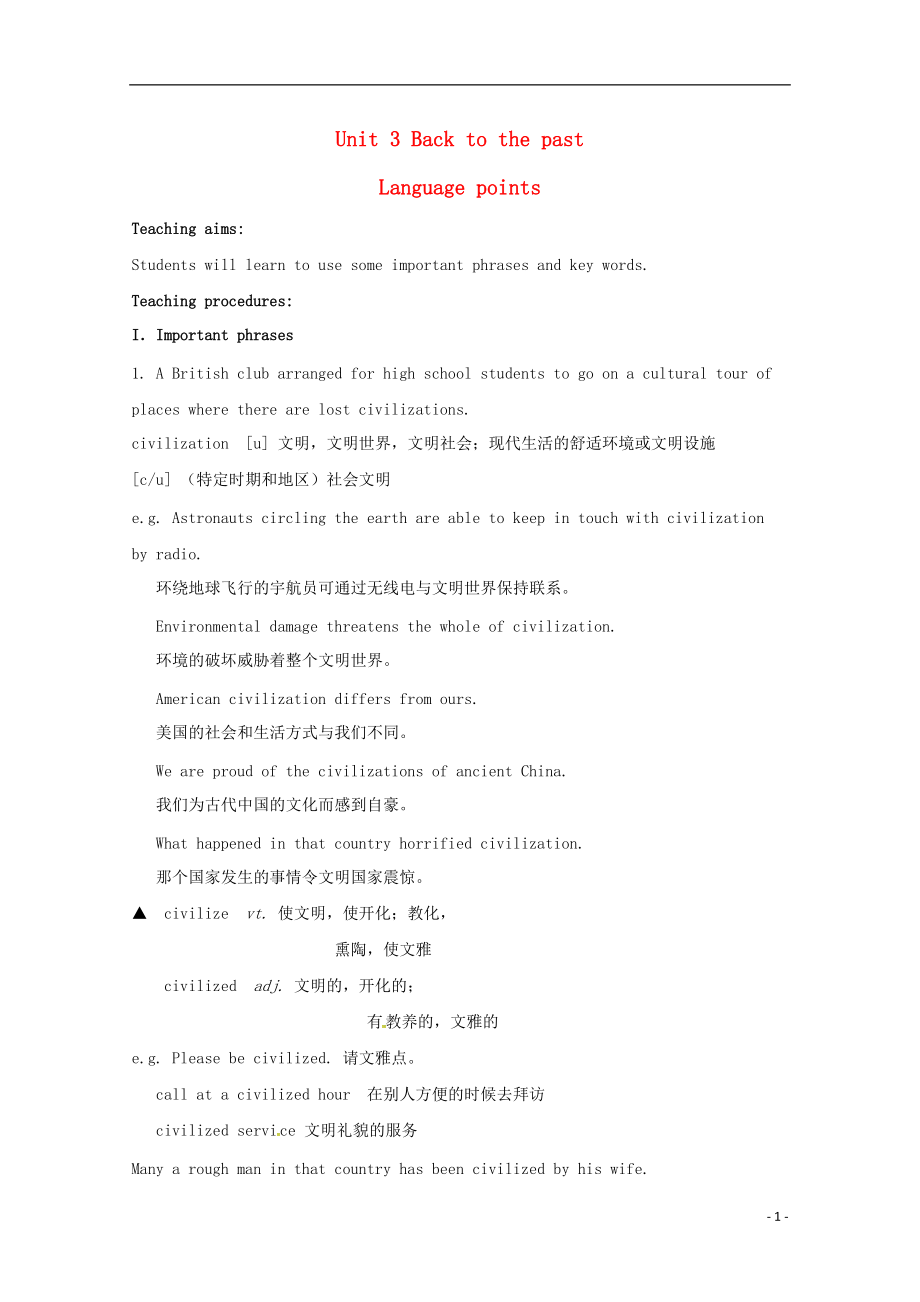《湖南省茶陵縣高中英語 Unit 3 Back to the past Language points教案 牛津譯林版必修3》由會員分享�,可在線閱讀���,更多相關(guān)《湖南省茶陵縣高中英語 Unit 3 Back to the past Language points教案 牛津譯林版必修3(5頁珍藏版)》請在裝配圖網(wǎng)上搜索�����。
1�����、
Unit 3 Back to the past
Language points
Teaching aims:
Students will learn to use some important phrases and key words.
Teaching procedures:
I.Important phrases
1. A British club arranged for high school students to go on a cultural tour of places where there are lost civilizations.
civi
2�����、lization [u] 文明,文明世界�����,文明社會����;現(xiàn)代生活的舒適環(huán)境或文明設(shè)施
[c/u] (特定時期和地區(qū))社會文明
e.g. Astronauts circling the earth are able to keep in touch with civilization by radio.
環(huán)繞地球飛行的宇航員可通過無線電與文明世界保持聯(lián)系。
Environmental damage threatens the whole of civilization.
環(huán)境的破壞威脅著整個文明世界��。
American civilization differs from our
3�����、s.
美國的社會和生活方式與我們不同。
We are proud of the civilizations of ancient China.
我們?yōu)楣糯袊奈幕械阶院馈?
What happened in that country horrified civilization.
那個國家發(fā)生的事情令文明國家震驚���。
▲ civilize vt. 使文明����,使開化��;教化���,
熏陶����,使文雅
civilized adj. 文明的��,開化的�;
有教養(yǎng)的�����,文雅的
e
4、.g. Please be civilized. 請文雅點�����。
call at a civilized hour 在別人方便的時候去拜訪
civilized service 文明禮貌的服務(wù)
Many a rough man in that country has been civilized by his wife.
在那個國家有許多粗野的男人都被妻子教化好了��。
Such things are not allowed to happen in a civilized society.
這樣的事情在文明社會是不允許發(fā)生的。
2. I feel lucky to have
5�����、 won a place on this trip.
win a place 意思是“贏得資格”
e.g. She will someday win a place in music’s hall of fame.
她將來會在音樂方面獲得不朽的成就�����。
填空:
She has __________ in the Olympic team.
她已獲得奧運代表隊的隊員資格。
He ____________ in the first team.
他失去了甲級隊員的資格���。
Key:
6、 won a place lost his place
3. The city was founded in the 8th century BC.
found vt. 建立�����;創(chuàng)建;創(chuàng)辦
e.g. Her family founded the college in 1895.
她家族1895年創(chuàng)辦了這所學院����。
The town was founded by English settlers in 1790.
7����、
這座城市是英國移民于1790年建立的。
4. In 89 BC, the Romans took over Pompeii.
take over 接任���;接管����;接收
e.g. You watch them until ten o’clock, and then I’ll take over.
你看他們看到10點鐘���,然后我接班。
CBS record
8���、s _____________ by Sony.
哥倫比亞廣播公司的唱片公司已被索尼公司收購。
When Mr. Green retired, his son _________ the business from him.
格林先生退休后由他兒子接管他的生意�����。
What is good and still useful _________
__________. 好的有用的東西應該繼承�。
Key: was taken over took over should be taken ove
9���、r
5. Many people were buried alive, and so was the city.
so was the city
“so + 助動詞 + 主語”這一結(jié)構(gòu)主要用來說明前面所說的情況也同樣適用于
后面的人或物,意為“……也一樣”�����。
e.g. He passed the exam, and so did I.
= He passed the exam, and I passed the exam, too.
= Both he and I passed the exam.
他通過了考試�����,我也通過了考試�。
10、 /他和我都通過了考試���。
注意區(qū)分:
“so + 主語 + 助動詞”結(jié)構(gòu)則主要用于加強語氣���,其意為“的確如此、確實如此”�,表示后者贊同前者的話或意見�����,只是進一步強調(diào)并重復前句所述的內(nèi)容�。前后句的主語指的是同一個人或物�。
e.g. — He has done a good job.
他干得不錯。
— So he has. 他的確干得不錯��。
6. People started to dig in the area for treasure, which caused much damage.
damage v. 損失���;損害�����,損壞
e.g. An ear
11、thquake sometimes causes great damage.
地震有時造成重大損失�。
單詞辨析
damage, destroy, ruin
damage是破壞,常常是局部的�,或可以修好的����。
e.g. The storm did a lot of damage to the crops.
暴風雨使莊稼受到了很大損失。
destroy 強調(diào)以具有摧毀或殺傷性的力量把某物徹底毀掉�����。
e.g. The building was completely destroyed by fire.
建筑物被大火徹底焚毀了。
ruin 作動
12����、詞時亦指徹底毀掉,但不含有以某種摧毀性的力量進行破壞���,而含
有在一定的過程中逐漸毀掉的意思�����。
e.g. The crops were ruined by the late frost.
莊稼被晚霜給凍壞了�����。
7. It turns out that after the ash covered the people who failed to flee the city.
flee vt. &vi. 逃避�,逃跑���;迅速離開
常用結(jié)構(gòu):flee (from) sb/sth
flee (to…/into…)
e.g. He fled t
13�、o London after an argument with his family.
他和家人吵架離家去了倫敦�。
II.難句解析
1. Near the city was a volcano.
離這個城市不遠處有一座火山。
這是一個倒裝句����。near the city為介詞短語作表語�����,此句的正常語序為:
A volcano was near the city��。為了保持句子平衡����,把介詞短語提至句首���,此時����,要引起句子的全部倒裝�。
例如:
On top of the books are the photo albums you’re looking for.
你要
14、找的相冊在那些書的上面�����。
West of the lake lies the famous city.
這個著名的城市在湖的西面��。
2. The city was forgotten for many years until the 18th century when a farmer discovered a stone with writing on it.
本句主句為The city was forgotten for many years until the 18th century�����;when引導一個定語從句��,修飾先行詞the 18th century����。
當先行詞是表示時間
15、或地點的名詞時����,定語從句用關(guān)系副詞還是關(guān)系代詞來引導����,要根據(jù)關(guān)系詞在定語從句中所擔當?shù)木渥映煞謥頉Q定�����。
(1) 當先行詞在定語從句中作狀語時�����,用關(guān)系副詞�����。
e.g. I will never forget the days when we spent our holidays together.
我永遠忘不了我們一起度假的日子�。
I know a place where we can have a picnic.
我知道一個我們可以野炊的地方�����。
(2) 當先行詞在定語從句中作其他成分時���,用關(guān)系代詞�。
e.g. I will never forget the days that / which we spent together.
我永遠忘不了我們一起度過的日子���。
I know a place that / which is famous for its beautiful natural scenery.
我知道一個以自然景色優(yōu)美而聞名的地方���。
- 5 -
 湖南省茶陵縣高中英語 Unit 3 Back to the past Language points教案 牛津譯林版必修3
湖南省茶陵縣高中英語 Unit 3 Back to the past Language points教案 牛津譯林版必修3

